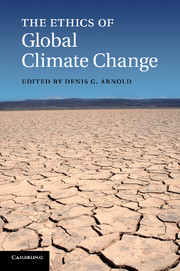Book contents
- Frontmatter
- Contents
- List of illustrations
- List of contributors
- Acknowledgements
- Introduction: climate change and ethics
- 1 Energy, ethics, and the transformation of nature
- 2 Is no one responsible for global environmental tragedy? Climate change as a challenge to our ethical concepts
- 3 Greenhouse gas emission and the domination of posterity
- 4 Climate change, energy rights, and equality
- 5 Common atmospheric ownership and equal emissions entitlements
- 6 A Lockean defense of grandfathering emission rights
- 7 Parenting the planet
- 8 Living ethically in a greenhouse
- 9 Beyond business as usual: alternative wedges to avoid catastrophic climate change and create sustainable societies
- 10 Addressing competitiveness in US climate policy
- 11 Reconciling justice and efficiency: integrating environmental justice into domestic cap-and-trade programs for controlling greenhouse gases
- 12 Ethical dimensions of adapting to climate change-imposed risks
- 13 Does nature matter? The place of the nonhuman in the ethics of climate change
- 14 Human rights, climate change, and the trillionth ton
- Select bibliography
- Index
- References
13 - Does nature matter? The place of the nonhuman in the ethics of climate change
Published online by Cambridge University Press: 11 April 2011
- Frontmatter
- Contents
- List of illustrations
- List of contributors
- Acknowledgements
- Introduction: climate change and ethics
- 1 Energy, ethics, and the transformation of nature
- 2 Is no one responsible for global environmental tragedy? Climate change as a challenge to our ethical concepts
- 3 Greenhouse gas emission and the domination of posterity
- 4 Climate change, energy rights, and equality
- 5 Common atmospheric ownership and equal emissions entitlements
- 6 A Lockean defense of grandfathering emission rights
- 7 Parenting the planet
- 8 Living ethically in a greenhouse
- 9 Beyond business as usual: alternative wedges to avoid catastrophic climate change and create sustainable societies
- 10 Addressing competitiveness in US climate policy
- 11 Reconciling justice and efficiency: integrating environmental justice into domestic cap-and-trade programs for controlling greenhouse gases
- 12 Ethical dimensions of adapting to climate change-imposed risks
- 13 Does nature matter? The place of the nonhuman in the ethics of climate change
- 14 Human rights, climate change, and the trillionth ton
- Select bibliography
- Index
- References
Summary
INTRODUCTION
Ethical discussion about climate change has focused on two highly significant sets of questions: questions about justice between existing peoples and nations, and questions concerning the moral responsibilities of existing people to future people. However, given the likely planetary effects of climate change, one might also expect to find a third area of ethical debate: questions about the impact of climate change on the nonhuman world directly. But on this subject, very little has so far been said. Of course, ecosystems and species have been important in existing political and ethical debate about climate, because climate change may affect them in ways that have serious implications for human beings. Floods and droughts may cause widespread human hunger; invasive species can spread human disease; loss of biodiversity may threaten ecosystem services. But in all these cases, the nonhuman world is understood to be of indirect moral concern; to use a distinction made by Jan Narveson, even though the object of the concern is ecosystems or species, the ground of the concern is human beings. Here, in contrast, I'm concerned with the ethical implications of climate change for species, ecosystems, organisms, and sentient animals directly, independently of the possible harms that such impacts might cause humans.
Certainly, concerns about the impact of climate change on the nonhuman world directly have been expressed, both by environmentalists and by ethicists. The Nature Conservancy, for instance, aims to “safeguard Nature from irreversible harm from a changing climate.”
- Type
- Chapter
- Information
- The Ethics of Global Climate Change , pp. 272 - 291Publisher: Cambridge University PressPrint publication year: 2011
References
- 31
- Cited by



